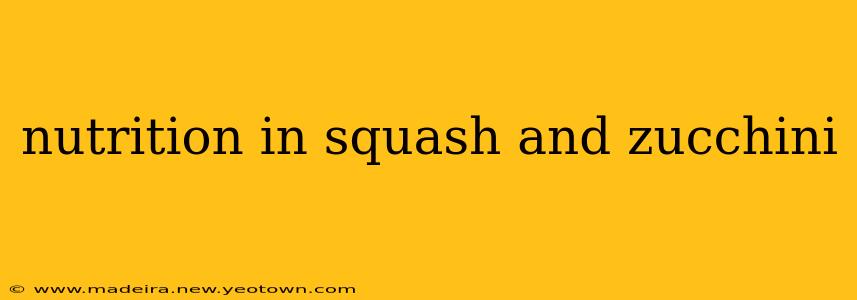The warm summer sun bathes your garden, and nestled amongst the leaves, plump zucchini and vibrant squash burst forth, promising delicious meals and a nutritional boost. But beyond their versatility in the kitchen, these humble vegetables are nutritional powerhouses, packed with vitamins, minerals, and antioxidants that benefit your health in countless ways. Let's delve into the fascinating world of squash and zucchini nutrition, exploring their benefits and answering some frequently asked questions.
What are the main nutritional benefits of squash and zucchini?
Squash and zucchini, while botanically distinct (zucchini is a summer squash, while varieties like butternut and acorn are winter squash), share a surprisingly similar nutritional profile. Both are exceptionally low in calories, making them ideal for weight management. Think of it this way: you get a substantial serving of vitamins and minerals for a minimal caloric intake. Imagine biting into a slice of roasted butternut squash, its sweetness hinting at the abundance of beta-carotene, a precursor to Vitamin A, crucial for eye health and immune function. Similarly, a simple zucchini stir-fry delivers a hefty dose of Vitamin C, a potent antioxidant that safeguards your cells against damage. Beyond vitamins, both squash and zucchini are good sources of potassium, essential for maintaining healthy blood pressure, and fiber, promoting healthy digestion.
Are squash and zucchini good for weight loss?
Absolutely! Their low calorie density and high fiber content make them perfect allies in your weight loss journey. The fiber keeps you feeling full and satisfied for longer, preventing those pesky between-meal cravings. This means you're less likely to overeat and consume excess calories, which is crucial for effective weight management. Moreover, the nutrients they provide support overall health, contributing to a balanced and sustainable approach to weight loss. Remember, weight loss is not just about restricting calories; it's about nourishing your body with nutrient-rich foods like squash and zucchini.
What are the differences in nutritional content between summer and winter squash?
While both share many nutritional benefits, there are some subtle differences. Summer squash, like zucchini and yellow squash, tends to have higher water content and a milder flavor. They’re lower in calories and carbohydrates compared to their winter counterparts. Winter squash, on the other hand, such as butternut, acorn, and kabocha, boasts a higher concentration of beta-carotene, fiber, and certain minerals. Their denser flesh provides a more substantial and satisfying texture. Think of it like this: summer squash offers a refreshing lightness, while winter squash provides hearty warmth and a richer nutritional profile. The best choice depends on your preferences and the dish you're preparing.
How can I incorporate more squash and zucchini into my diet?
The beauty of squash and zucchini lies in their versatility. They're incredibly adaptable to various cooking methods. You can grill them, roast them, sauté them, add them to soups and stews, or even spiralize them into noodles. Let your creativity flow! Imagine the vibrant colors and flavors: a creamy zucchini soup, perfectly roasted butternut squash with maple syrup and cinnamon, or zucchini noodles tossed with pesto and cherry tomatoes. The possibilities are endless, ensuring you can enjoy these nutritional gems throughout the year.
Are there any potential downsides or allergies related to eating squash and zucchini?
Generally, squash and zucchini are well-tolerated and pose minimal risks. However, some individuals might experience mild digestive discomfort if consumed in large quantities due to the fiber content. Allergic reactions are rare, but as with any food, it's crucial to observe your body's response. If you notice any unusual symptoms after consumption, it's best to consult a doctor or allergist.
This exploration into the nutritional world of squash and zucchini highlights their remarkable contributions to a healthy diet. From weight management to boosting immunity, these versatile vegetables offer a plethora of benefits, making them essential additions to your plate. So, next time you visit your local farmer's market or tend to your garden, remember the nutritional treasures awaiting within these humble yet powerful plants.

